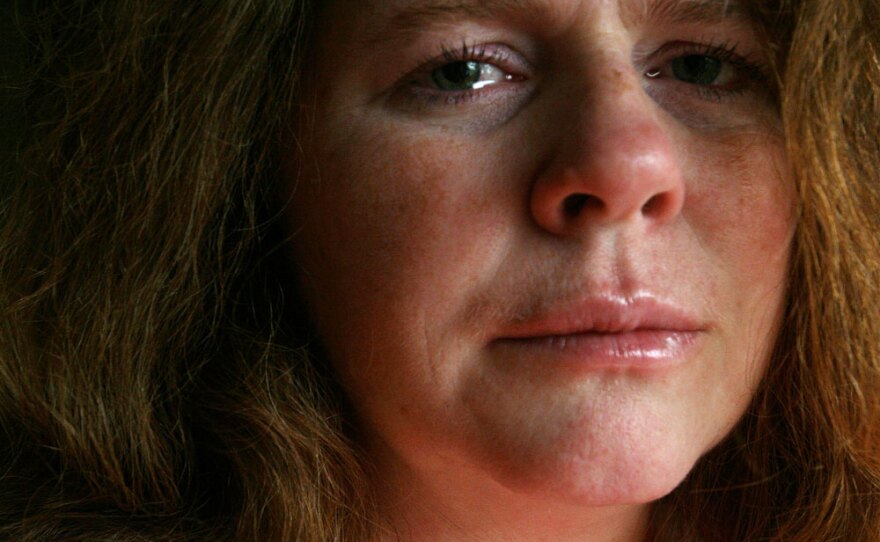A U.S. Army study released Thursday says it suffered a record number of soldier suicides last year, pointing to a military that has been stretched thin by wars in Afghanistan and Iraq.
The report says 160 soldiers took their own lives in 2009; another 1,800 tried to commit suicide. The report says multiple deployments and too little time at home are part of the underlying problem.
While every branch of the military must cope with suicides, the Marines have been hit the hardest.
Realizing A Dream
Mary and James Gallagher had been married for less than a year when he told her one night at the dinner table in November 1987 that he wanted to fulfill his lifelong dream.
"He actually had come home one day and said to me, 'You know, Mary, I really, really want this. I really want to, you know, join the Marine Corps.' And I said, 'OK, Jim, if this is what you'd like.
"And he said, 'Oh, great -- the recruiter will be here tomorrow for you to sign the papers.' So he already had signed up."
James Gallagher loved being a Marine. He was an infantryman who rose to the rank of gunnery sergeant. In 2005, he was deployed to Iraq and assigned to Ramadi, where it was a violent and deadly summer. Twelve men in Gallagher's unit were killed, including his commanding officer.
'Lot Of Ugly Things'
Mary Gallagher said when her husband returned stateside, he kept the worst of it to himself: "Most Marines were not ones to really talk at all. Jim always said he'd placed it in his heart, and he said, 'I'll carry it forward because that's what I have to do and that's how I'll get through it.'
"I'm sure he saw a lot of ugly things. I just don't know all the ugly he did see."
After he returned home, Sgt. Gallagher was soon sent to the Marines advanced course. Mary Gallagher said her husband seemed mostly fine.
"I didn't really see it coming at all. I think that people are a little misled at the fact that PTS is very visible, but it's not as visible as people think," she said.
PTS refers to post-traumatic stress.
It is only in retrospect that Mary Gallagher can see what she missed at the time.
"To me, he just seemed sad. You know, he was not quite himself, but, you know, I just had no idea that he was really struggling as bad as he was," she said. "And obviously he was struggling a lot.
"And that's the hardest part for me. You know, it's something I carry with me every day, that I didn't notice that I didn't realize how much he was hurting."
A 'Crippling' Discovery
Eight months after Sgt. Gallagher returned home, his unit was getting ready to deploy again. That seemed to throw him. Mary Gallagher said her husband seemed distracted, a little out of it. The 19-year Marine veteran would sometimes quietly confide to her that he wasn't sure he was up for it.

When Mary Gallagher took the children to Disney World with family friends, her husband decided to stay behind. The day before they were to go home, Mary talked to her husband on the phone. He was stressed; she reassured him.
"Our last phone call of that day, he just repeatedly told me how much he loved me and, you know, if I truly knew how much he loved me, and I said, 'I do, Jim, and we can get through this together.'
"And my children and I came home, and my daughters actually found their father before I could protect them from that -- and he was hanging in the garage in our home."
Gallagher and her three teenage children were blindsided, and they grieved intensely.
"It was crippling," she said. "It truly crippled us."
A Military Support Group
Gallagher said their salvation came when she discovered the military support group TAPS, the Tragedy Assistance Program for Survivors. There, her family was greeted as if her husband had died in battle, like he was a war hero -- and like they should all be proud.
Under the white-hot light of that perspective, the Gallaghers' shame and guilt began to melt away.
"Everyone embraced you, and I think that's what surprised me most of all and kind of brought me back a bit, like, 'Wow, we're being accepted here,' " she said. "It didn't matter that he killed himself. What matters was that he served our country."
Mary Gallagher has become a peer mentor at TAPS, specializing in families who've lost a soldier to suicide. Four years later, they still miss Sgt. James Gallagher, whose 19 years of service to his country eventually cost him his life.
Copyright 2022 NPR. To see more, visit https://www.npr.org. 9(MDAzMjM2NDYzMDEyMzc1Njk5NjAxNzY3OQ001))







